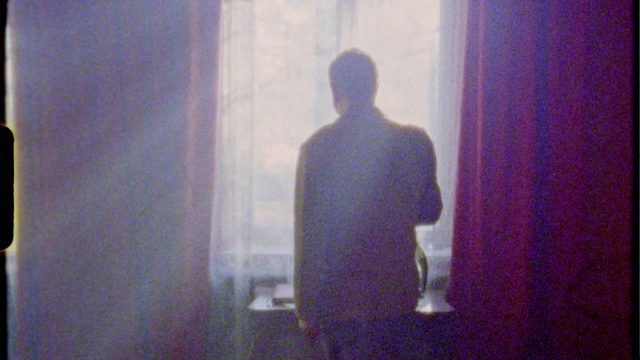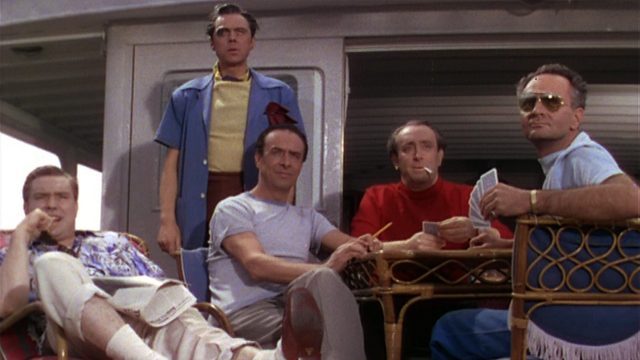
The Prince and the Dybbuk makes its U.S. premiere at the New York Jewish Film Festival
THE PRINCE AND THE DYBBUK (Piotr Rosolowski & Elwira Niewiera, 2017)
Film Society of Lincoln Center, Walter Reade Theater
165 West 65th St. at Amsterdam Ave.
Wednesday, January 10, 2:45, and Thursday, January 11, 9:00
Festival runs January 10-23
212-875-5601
www.filmlinc.org
prince-dybbuk.com
 The New York Jewish Film Festival gets under way January 10 with an intriguing look at enigmatic filmmaker Michał Waszyński, the director of one of the most important Yiddish movies of all time, the 1937 supernatural tale The Dybbuk. In The Prince and the Dybbuk, directors Piotr Rosolowski and Elwira Niewiera find that discovering who Waszyński was is like chasing a ghost, as he continually reinvented himself while being haunted by a past he tried to erase. Like the characters in many of the films he produced and directed, he was constantly searching for his true identity as he journeyed from Poland and Germany to Italy and Spain. “He was in his world, so mysterious and exciting. Nobody really knows what he’s really like,” one of his assistant directors, Enrico Bergier, says. Throughout the eighty-minute documentary, friends, relatives, colleagues, and others describe Waszyński, who produced and/or directed nearly 150 films, as a gentleman, Jewish, Catholic, noble-minded, lonely, elegant and refined, an exceptional boss, generous, isolated, very smart, a larger-than-life character, an aristocrat, a bit strange, and a mythomaniac. He married a countess, dubbing himself the Polish Prince, and took one of his actors, Albin Ossowski, to gay restaurants. “He was longing for his youth,” Ossowski says. He hobnobbed with Orson Welles, Sophia Loren, Audrey Hepburn, and Claudia Cardinale. He appeared in Joseph L. Mankiewicz’s 1954 film, The Barefoot Contessa. He was singled out by Josef Goebbels as an enemy. He was involved with such 1960s blockbusters as El Cid and The Fall of the Roman Empire as well as smaller Eastern European films, most famously The Dybbuk, about a young bride possessed by a spirit. Rosolowski and Niewiera, who previously collaborated on the award-winning Domino Effect, include newsreel footage, family photos, home movies, a behind-the-scenes promotional piece narrated by James Mason about the making of Anthony Mann’s budget-busting The Fall of the Roman Empire, spoken excerpts from Waszyński’s diaries, and clips from such Waszyński films as His Excellency the Shop Assistant, Unknown Man of San Marino, Dvanáct kresel, Gehenna, Wielka Droga, Zabawka, and Znachor, many of which feature lost characters.
The New York Jewish Film Festival gets under way January 10 with an intriguing look at enigmatic filmmaker Michał Waszyński, the director of one of the most important Yiddish movies of all time, the 1937 supernatural tale The Dybbuk. In The Prince and the Dybbuk, directors Piotr Rosolowski and Elwira Niewiera find that discovering who Waszyński was is like chasing a ghost, as he continually reinvented himself while being haunted by a past he tried to erase. Like the characters in many of the films he produced and directed, he was constantly searching for his true identity as he journeyed from Poland and Germany to Italy and Spain. “He was in his world, so mysterious and exciting. Nobody really knows what he’s really like,” one of his assistant directors, Enrico Bergier, says. Throughout the eighty-minute documentary, friends, relatives, colleagues, and others describe Waszyński, who produced and/or directed nearly 150 films, as a gentleman, Jewish, Catholic, noble-minded, lonely, elegant and refined, an exceptional boss, generous, isolated, very smart, a larger-than-life character, an aristocrat, a bit strange, and a mythomaniac. He married a countess, dubbing himself the Polish Prince, and took one of his actors, Albin Ossowski, to gay restaurants. “He was longing for his youth,” Ossowski says. He hobnobbed with Orson Welles, Sophia Loren, Audrey Hepburn, and Claudia Cardinale. He appeared in Joseph L. Mankiewicz’s 1954 film, The Barefoot Contessa. He was singled out by Josef Goebbels as an enemy. He was involved with such 1960s blockbusters as El Cid and The Fall of the Roman Empire as well as smaller Eastern European films, most famously The Dybbuk, about a young bride possessed by a spirit. Rosolowski and Niewiera, who previously collaborated on the award-winning Domino Effect, include newsreel footage, family photos, home movies, a behind-the-scenes promotional piece narrated by James Mason about the making of Anthony Mann’s budget-busting The Fall of the Roman Empire, spoken excerpts from Waszyński’s diaries, and clips from such Waszyński films as His Excellency the Shop Assistant, Unknown Man of San Marino, Dvanáct kresel, Gehenna, Wielka Droga, Zabawka, and Znachor, many of which feature lost characters.

Enigmatic filmmaker Michał Waszyński (in red shirt) plays cards in Joseph L. Mankiewicz’s The Barefoot Contessa
Waszyński was born Moshe Waks in the village of Kovel in Poland (what is now Ukraine) in 1904 and later changed his name to Michał Waszyński and converted to Catholicism. Even when facts are revealed about him, there is no evidence about why he did the things he did in his personal life. “To me he was a great magician. He lived in a dream world, because cinema is a dream,” explains Maurizio Dickmann, a member of the Italian family that took him in. Later, in an Under the Flag of Love radio broadcast, Waszyński explains, “I do what I love. Cinema is my passion and it stimulates my intellect. . . . To me, film is like a second reality, subject to completely different rules. In a split second, a king can become a shepherd or a beggar a rich man.” His diaries divulge a dark side about his search for who he is and who he was as he transformed himself from shepherd to king. “My city vanishes from my mind, as if the place of my youth had never existed,” he writes. “But I can never rid myself of you. You were the one who abandoned us. Although, even now, in my dreams and when awake, you return to me every night, like a stab to the heart. You drive deep inside me. Like an evil spirit, you circle around me.” Waszyński was chased by spirits his entire life — he passed away suddenly in 1965 — and turned to the movies for answers, which only led to more questions. Named Best Documentary on Cinema at the Venice Film Festival, The Prince and the Dybbuk is making its U.S. premiere at the New York Jewish Film Festival, screening at the Walter Reade Theater on January 10 at 2:45 and January 11 at 9:00, preceded by Daria Martin’s short film A Hunger Artist, based on the Franz Kafka story. The January 11 screening will be followed by a Q&A with Rosolowski, Niewiera, and Martin. A copresentation of the Jewish Museum and the Film Society of Lincoln Center, the festival, which runs January 10-23, is also showing the world premiere of a brand-new restoration of The Dybbuk on January 14 and 17.